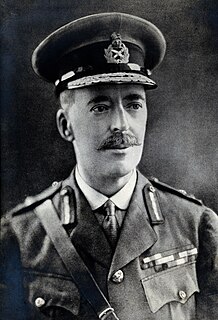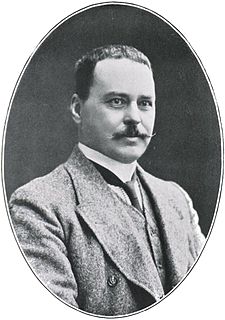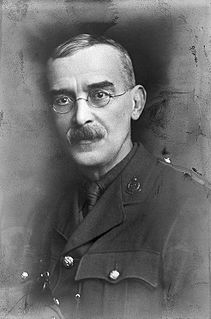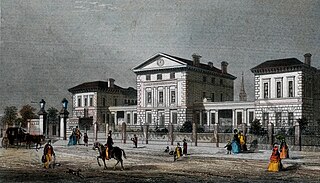Related Research Articles

Lieutenant-General Sir William Boog Leishman, was a Scottish pathologist and British Army medical officer. He was Director-General of Army Medical Services from 1923 to 1926.

Sir Ronald Ross was a British medical doctor who received the Nobel Prize for Physiology or Medicine in 1902 for his work on the transmission of malaria, becoming the first British Nobel laureate, and the first born outside Europe. His discovery of the malarial parasite in the gastrointestinal tract of a mosquito in 1897 proved that malaria was transmitted by mosquitoes, and laid the foundation for the method of combating the disease. He was a polymath, writing a number of poems, published several novels, and composed songs. He was also an amateur artist and natural mathematician. He worked in the Indian Medical Service for 25 years. It was during his service that he made the groundbreaking medical discovery. After resigning from his service in India, he joined the faculty of Liverpool School of Tropical Medicine, and continued as Professor and Chairman of Tropical Medicine of the institute for 10 years. In 1926 he became Director-in-Chief of the Ross Institute and Hospital for Tropical Diseases, which was established in honour of his works. He remained there until his death.
One of the greatest challenges facing the builders of the Panama Canal was dealing with the tropical diseases rife in the area. The health measures taken during the construction contributed greatly to the success of the canal's construction. These included general health care, the provision of an extensive health infrastructure, and a major program to eradicate disease-carrying mosquitoes from the area.

The Liverpool School of Tropical Medicine (LSTM) is a higher education institution with degree awarding powers and registered charity located in Liverpool, United Kingdom. Established in 1898, it was the first institution in the world dedicated to research and teaching in tropical medicine. The school has a research portfolio of over £220 million, assisted by funding from organisations such as the Bill & Melinda Gates Foundation, Wellcome Trust and Department for International Development (DFID).

Calcutta School of Tropical Medicine (CSTM) is a medical institute from Kolkata, India dedicated in the field of tropical disease. It was established in 1914 by Leonard Rogers (1868–1962) of the Indian Medical Service, professor of pathology at the Calcutta Medical College. It was, till 2003, affiliated with the University of Calcutta. Now it is under the West Bengal University of Health Sciences.

Begumpet is a part of Secunderabad, Hyderabad, Telangana, India. Begumpet is named after the daughter of the sixth Nizam, Basheer Unnisa Begum, who received it as part of her wedding dowry when she was married to the second Amir of Paigah Shams ul Umra Amir e Kabir.

Tirumalagiri or Trimulgherry is a locality and a Mandal in the city of Secunderabad also it falls under Secunderabad Revenue Division, Earlier is a major suburb of Secunderabad, India. Trimulgherry is the anglicised name for Tirumalagiri. It is in the north of Hyderabad District.

Osmania Medical College, formerly known as The Hyderabad Medical School, is a medical college in Hyderabad, Telangana, India. It is one of the top medical schools in the subcontinent, and was founded in 1846 by the 5th Nizam of Hyderabad and Berar, Afzal ud Dowla. The college was originally affiliated to Osmania University system, It is now affiliated to the Kaloji Narayana Rao University of Health Sciences, and the Osmania General Hospital. After the establishment of the Osmania University in 1919, the school was renamed Osmania Medical College, after the seventh Nizam of Hyderabad, Mir Osman Ali Khan.

The Calcutta Chromosome is a 1995 English-language novel by Indian author Amitav Ghosh. The book, set in Calcutta and New York City at some unspecified time in the future, is a medical thriller that dramatizes the adventures of people who are brought together by a mysterious turn of events. The book is loosely based on the life and times of Sir Ronald Ross, the Nobel Prize–winning scientist who achieved a breakthrough in malaria research in 1898. The novel was the recipient of the Arthur C. Clarke Award in 1997.
In the 2006 dengue outbreak in India, cases of dengue fever were reported first from New Delhi in early September and by the end of September other states also started to report deaths. At least 3613 confirmed cases of dengue fever were reported and over 50 people died in the outbreak.

Amico Bignami was an Italian physician, pathologist, malariologist and sceptic. He was professor of pathology at University of Rome. His most important scientific contribution was in the discovery of transmission of human malarial parasite in the mosquito.
Warburg's tincture was a pharmaceutical drug, now obsolete. It was invented in 1834 by Dr. Carl Warburg.

IPGMER and SSKM Hospital, or in its full name Institute of Post-Graduate Medical Education and Research and Seth Sukhlal Karnani Memorial Hospital, colloquially known as P. G. Hospital, also known as PGI KOLKATA, is a government medical school and tertiary referral government hospital for the state of West Bengal, India and is a national research institute. It is currently the best super-speciality hospital and medical college in West Bengal.
Sir Ronald Ross Institute of Parasitology is a malaria research institute located in Begumpet, Secunderabad, Hyderabad, India. Established in 1955, the institute is a division of Osmania University. The institute is named after Sir Ronald Ross, winner of Nobel Prize for Physiology or Medicine, 1902.

Mosquito-malaria theory was a scientific theory developed in the latter half of the 19th century that solved the question of how malaria was transmitted. The theory basically proposed that malaria was transmitted by mosquitoes, in opposition to the centuries-old medical dogma that malaria was due to bad air, or miasma. The first scientific idea was postulated in 1851 by Charles E. Johnson, who argued that miasma had no direct relationship with malaria. Although Johnson's hypothesis was forgotten, the arrival and validation of the germ theory of diseases in the late 19th century began to shed new lights. When Charles Louis Alphonse Laveran discovered that malaria was caused by a protozoan parasite in 1880, the miasma theory began to subside.
Ravivarma Marthanda Varma was an Indian neurosurgeon, one of the pioneers of Indian neurosurgery and the founder director of the National Institute of Mental Health and Neurosciences (NIMHANS). He was the originator of a new surgical procedure for treating Parkinson's disease which later came to be known as Varma's Technique. He was a former Deputy Director General of Health Services, Government of India and an honorary surgeon to R. Venkataraman, former president of India. He was honoured by the Government of India in 1972 with Padma Shri, the fourth highest Indian civilian award.
Subhash Chand Manchanda is an Indian cardiologist and a senior consultant of Sir Ganga Ram Hospital, New Delhi. He is a Senior Consultant and Co-ordinator of the Diplomate of National Board program of the National Board of Examinations and a former professor and Head of the Department of Cardiology at the All India Institute of Medical Sciences, New Delhi (AIIMS). He is the chairman of the Advisory Board of Diya Foundation, a non governmental organization managing a number of charitable institutions for the under-privileged children and aged people.

John William Watson Stephens FRS (1865–1946) was a British parasitologist and expert on tropical diseases.

A fever hospital or isolation hospital is a hospital for infectious diseases such as scarlet fever and smallpox. Their purpose is to treat affected people while isolating them from the general population. Early examples in England included the Liverpool Fever Hospital (1801) and the London Fever Hospital (1802).

Sir William John Ritchie Simpson was a Scottish physician and specialist in tropical medicine.
References
- ↑ "Fever Hospital to get Sars kits in a week". The Times of India . 20 April 2003. Archived from the original on 5 September 2012.
- ↑ Paulson, Tom (8 December 2003). "In India, progress has been stunning". Seattle Post-Intelligencer Reporter.